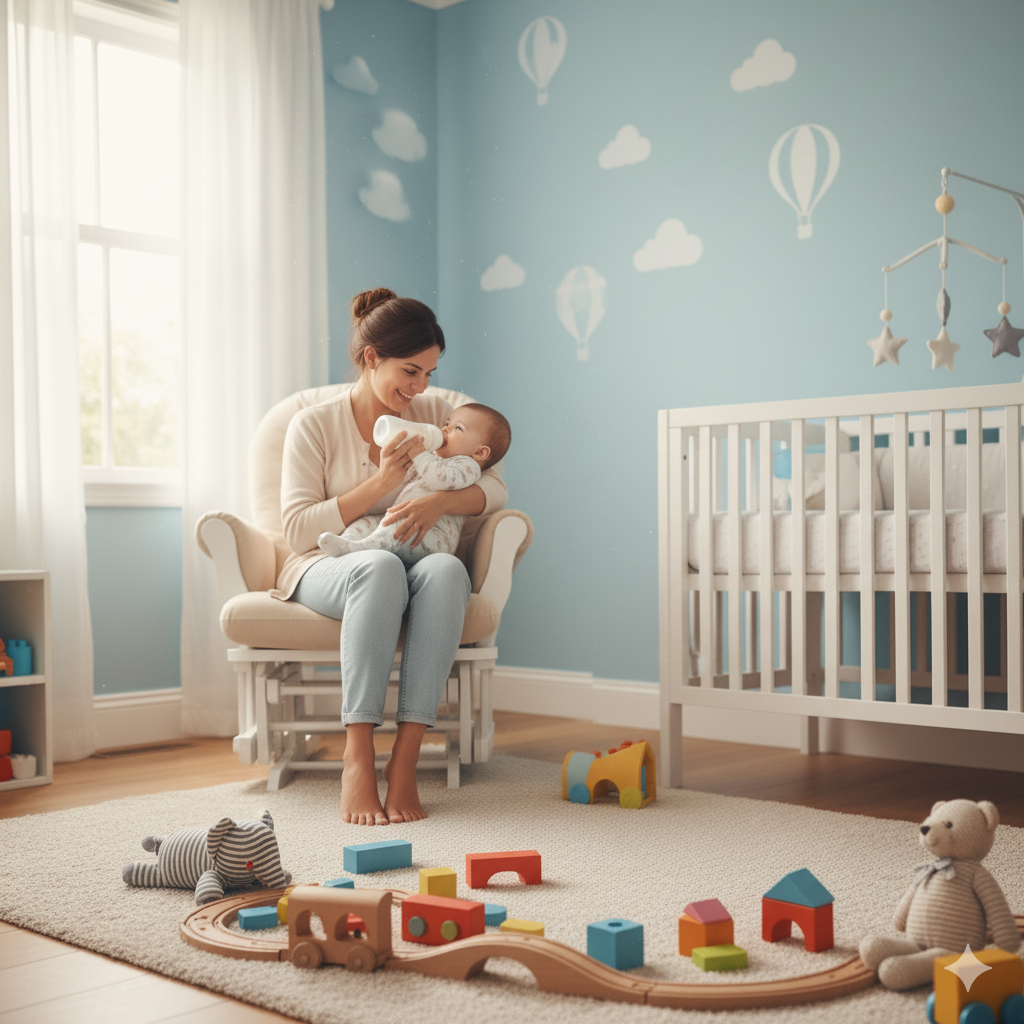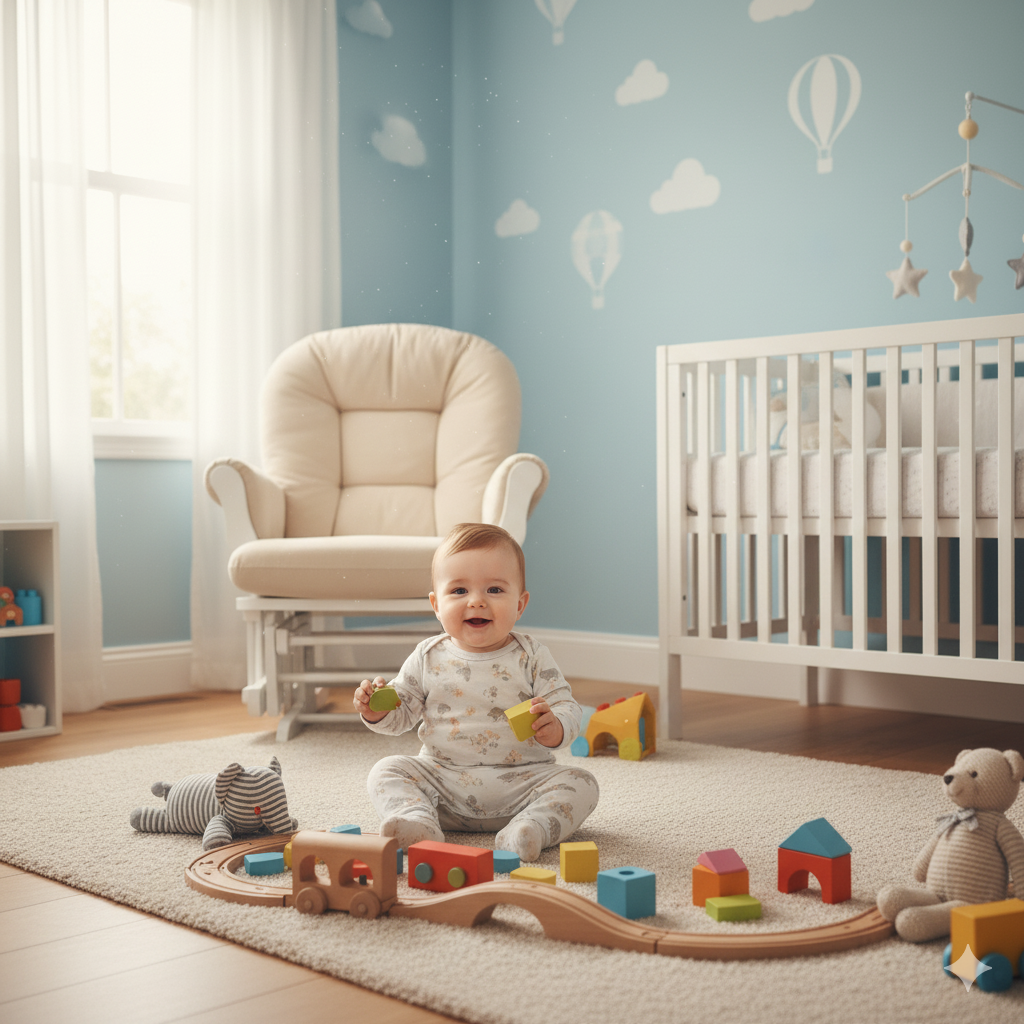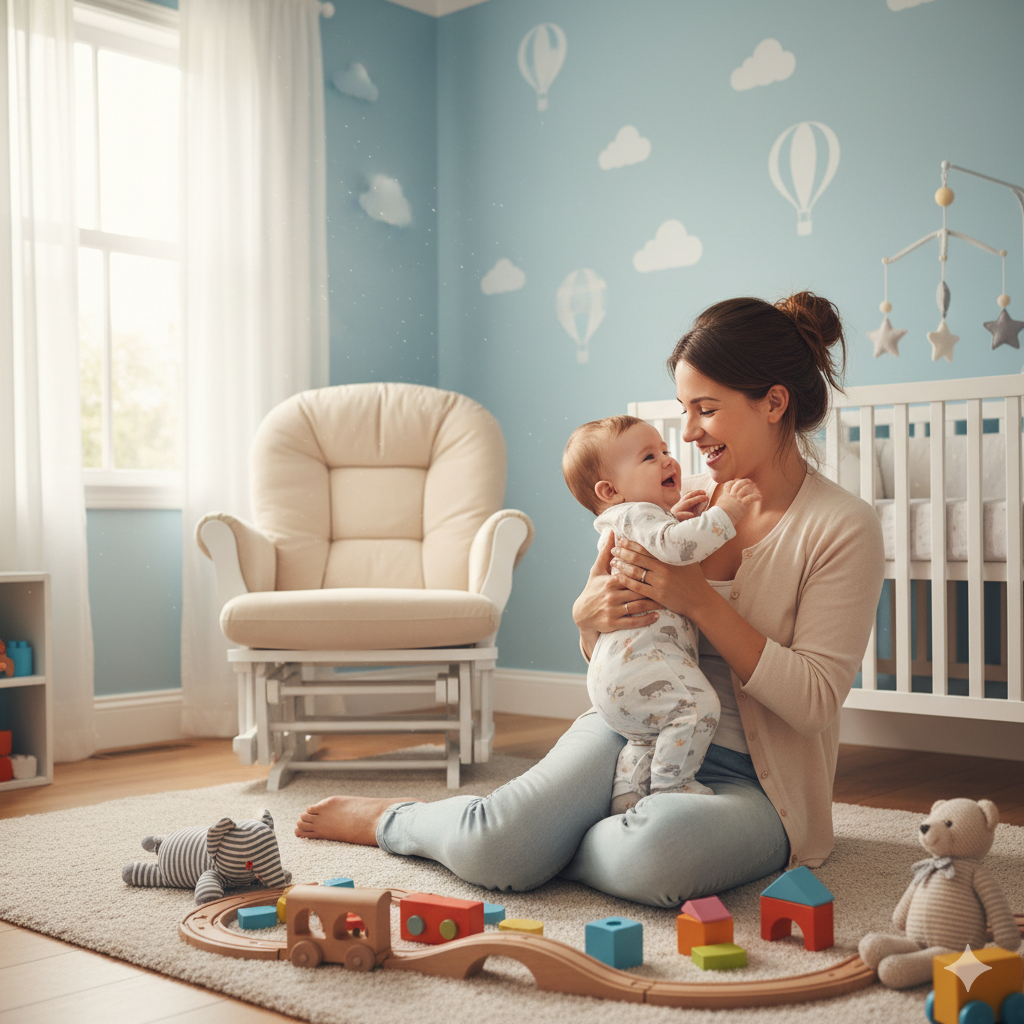The first year of your little one is almost always a whirlwind of growth, exploration and magic. Your child reaches so many milestones starting from that first adorable smile to those shaky first steps – these milestones mean big accomplishments for your tiny tot. Knowing what to expect in those twelve amazing months can help you honor every milestone, and every baby it’s binding path.
Why Developmental Milestones Matter
Developmental milestones are skills or behaviors that children tend to learn during a specific age range. These are physical milestones such as rolling over and sitting up, communication milestones such as cooing and babbling, and social milestones such as smiling and waving goodbye. Although kids are unique and some may even like to take their own time getting there, milestones offer helpful pointers to track your child’s growth in movement, learning, speech, and social skills.
Keep in mind that milestone timelines are a range, and not a hard and fast deadline. Some infants walk at nine months, while others wait until they are nearly fifteen months old to take their first steps. Both are perfectly normal. The pt is that progress as a whole is to be recognized, not when it is recognized w/o a point.
Month-by-Month Development: What to Expect
Months 0-3: The Foundation Building Phase

Physical Development
In the first three months, your newborn will go from feeling like a little bundle with uncoordinated movements to being a baby who is starting to manage their body. In the beginning, your baby will clutch their hands and may have strabismus (cross eyes) at some times. At about a month or so you will see that they are beginning to focus on faces and follow moving objects with their eyes.
Most babies can lift their head for a short time during tummy time by two months, and by three months, they are usually holding their head steady and are even able to push up on their arms while lying down on their stomach. Since tummy time is vital at this stage for building the necessary neck, shoulder, and arm muscles that the baby will use for other milestones later on,
Communication and Social Skills
The conversation starts with eye contact and naturally develops into coos and gurgles made by your new baby. The first social smile when your baby finally looks up at you and smiles with intent typically falls between six and eight weeks and it’s a magical time because it means your baby is starting to engage with the world. At three months, most babies are beginning to produce vowel sounds and laugh out loud.
What You Can Do
Incorporate tummy time into your daily routine, even if it is only a few minutes two to three times a day. Frequent talking, singing and reading to your baby. Encourage talk back by replying to their coos and sounds. Give them loads of face time, your face is your babies favorite face to look at.
Months 4-6: Gaining Control and Confidence
Physical Development
The latter months are when you can witness a fantastic physical transformation. By the time they’re about four months old, most babies can roll over from their stomachs to their backs, and by six months, they can roll from their backs to their stomachs. It is a time when everything comes down to sitting. Between 4 and 6 months of age, your baby will sit well with support and eventually alone for short intervals.
Hand-eye coordination improves dramatically. You’re baby will begin to wave their arms and grasp things, putting everything in their mouth to examine. This exploratory oral behavior is perfectly natural and one of the ways babies learn about their environment.
Communication and Social Skills
During this time, they will spend a lot of time with all the babbling. When they babble, your baby may begin to combine vowels, producing sounds such as “ah-ah-ah” or “eh-eh-eh.” They are also more social, calling out when you say their name and learning other friendly faces. From six months onwards, many babies start to show stranger anxiety, becoming more selective about which people they like best, preferring parents and caregivers.
What You Can Do
Continue supervised tummy time, and start sitting practice with a pillow to prop up your baby. Provide safe toys for both grasping and mouthing. Pretend to have an actual conversation with them when they babble, which will help with language learning. Develop social skills and understanding of object permanence by playing simple games like peekaboo.
Months 7-9: On the Move
Physical Development
Mobility explodes during these months. Crawling is common for most babies, but how they crawl can look quite different. Some traditional hands-and-knees crawlers, others bottom scoote, some army crawlers (belly down), still others skip crawling altogether and head straight to pulling up.
Most babies can pull themselves to standing while gripping onto furniture by 9 months of age. A few courageous ones begin cruising along furniture moving sideways with assistance. Your baby is on the go and able to get into some never-before-accessed spaces so it is now time to truly baby-proof your house!
Communication and Social Skills
Babbling is more advanced, and babies begin to string different sounds together with consonants such as “ma-ma-ma” or “ba-ba-ba.” They’re not technically words yet, but they are in the realm of speech preparation. Your baby can understand a lot more than she can say, and might follow simple directions like “wave bye-bye.”

What You Can Do
Help your baby explore safely and freely Place interesting toys just out of reach to encourage crawling. Talk the entire day, until you put your head on the cushion, honing your child how to fucking exist narrating the day, let your child in on what you are doing or what you will do and object names. Make a habit out of reading board books together so that your baby could turn the pages and/or point to pictures.
Months 10-12: Approaching Independence
Physical Development
The last few months of the first year is where parents start looking forward to the milestone they anticipate the most; the first steps. Some babies walk on their own by their first birthday, but many do not walk until several months later. Both timelines are completely normal.
Prior to getting there is a significant amount prep. Your little one is practising standing solo for a few seconds, tentatively taking steps with you holding his hands or moving independently while holding on to furniture to cruise confidently. Other things are their fine motor skills that grow exponentially. By this age, your baby probably is picking up small objects with thumb and forefinger pincer grasp, deliberately dropping or throwing toys, and may also be using utensils during meals.
Communication and Social Skills
By 12 months of age, most babies say at least one real word and constantly try to copy what others say. Typical first words are mama, dada, ball, or dog; Your baby knows many more words than they can speak themselves and can follow simple commands like “give me the toy.”
By the time your baby becomes a toddler, you will notice your little one is beginning to show their personality. They might display a sense of humour, challenge limits, and assert their opinions firmly. This is also the time when separation anxiety might be at its worst!
What You Can Do
Encourage practice walking by safely baby-proofing and providing push toys. Avoid the use of baby walkers, which are potentially hazardous. Keep reading every day and label everything in sight so that your baby can grow her vocabulary. Encourage self-feeding, knowing it will be messy Provide safe spaces for exploration, but always supervise when your child is practicing independence.
Red Flags: When to Talk to Your Pediatrician
While developmental timelines vary widely, certain signs warrant a conversation with your pediatrician. Contact your doctor if your baby:
- Shows no interest in reaching for objects by six months
- Cannot sit without support by nine months
- Doesn’t babble or make varied sounds by nine months
- Doesn’t show recognition of familiar people by nine months
- Isn’t crawling or moving forward by twelve months
- Doesn’t point at objects by twelve months
- Loses skills they previously had at any age
Trust your parental instincts. If something feels off, it’s always better to discuss your concerns with your pediatrician. Early intervention, when needed, can make a significant difference.
Supporting Your Baby’s Development
Create a Nurturing Environment
Everyday interactions are where your baby learns best. When they cry, respond quickly, and on their cue, and they know that they can trust you, and that they are safe. Throughout the day, talk, sing, and read to your baby. This is how they cultivate language and develop their attachment to you.
Provide Safe Exploration Opportunities
Babies learn through sensory experiences. Provide toys with different textures, sounds, and colors. Make safe spaces where your baby is free to explore without you saying “no” at every turn. Sitting in a bouncer or a swing is not time well spent; supervised floor time is priceless.
Prioritize Quality Interactions
During play and care routines, put your phone down and give your baby your full attention. They may be there for you when you need them, [] but they are probably not for your baby for such moments: Where your baby learns about relating, talking and the world.
Take Care of Yourself
Parenting an infant is exhausting. Caring for yourself is not selfish, but a necessity! An early parent who is well-rested and mentally healthy will be able to support their baby’s development much better. Receive assistance when available, and call on your support network when you require a breather.
Every Baby Is Unique
The most crucial thing to know about developmental milestones is that they are averages based on a large number of children. Your child is their own person with their own calendar and gifts. For some babies, this is excel in the physical area but is much slower in the communication area, for others they are the early talkers and they are not in a hurry to walk yet. Both of these paths are expressed in normal, healthy variation.
Resist Comparing Your Baby to Others Whether a sibling, a friend of mine’s child, or other babies in social media. Such comparisons sap joy from your baby’s journey and foster needless anxiety. Rather, you will want to look for skills as your little one learns each one one at a time.
The Journey Ahead
The first year of your little ones life is an incredible time of development and change. From that first day when they spent much of the time sleeping to their first birthday, at which point they are likely on the move and socially engaged, the changes are nothing short of miraculous. Knowing expected development can help you celebrate each milestone and guide you through areas to watch out for in order to support and properly encourage growth in your baby.
Just keep that you do not have to be perfect parent You just need to show up, be there, and show your love and care. All those diaper changes, feedings, snuggles, and playtime you did during this first year of life help build the foundation for your child’s development in your child’s life, in so many special ways.
Cherish these fleeting months. And there are days are long but there are also years are short Just like that, before you know it that little new born will be chasing you around out of breath. Record the journey, celebrate the big and little achievements and most importantly, enjoy meeting the awesome little person who is growing right in front of your eyes.
